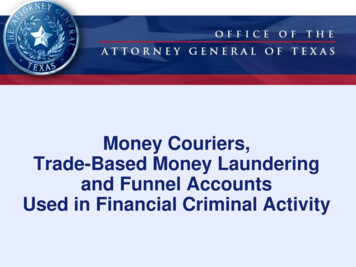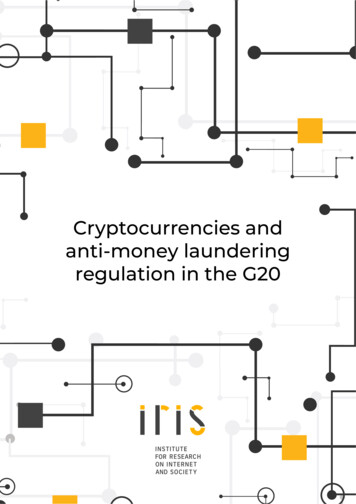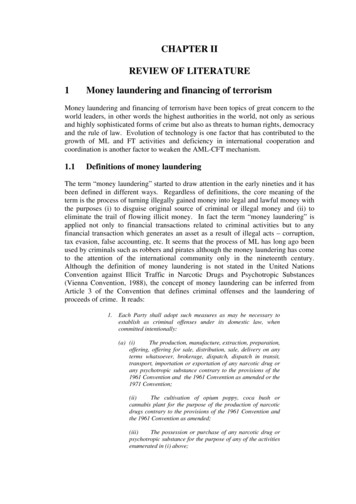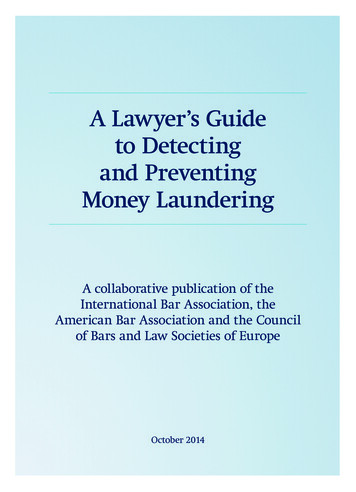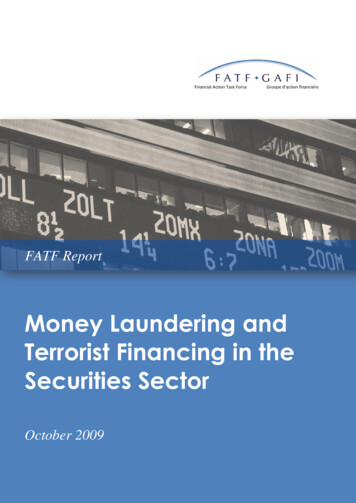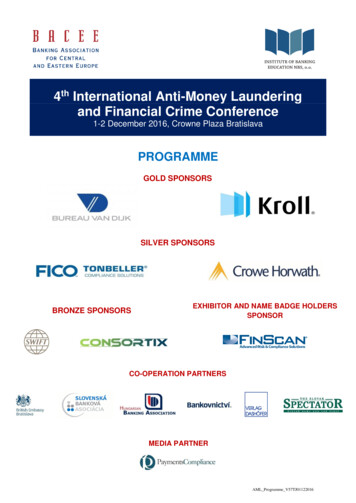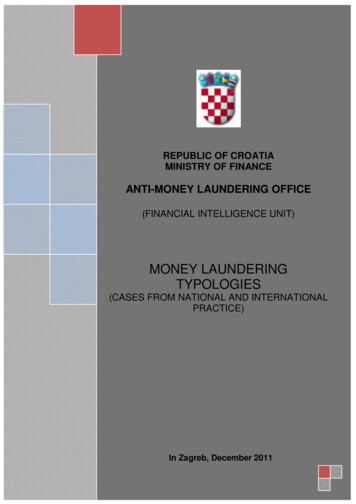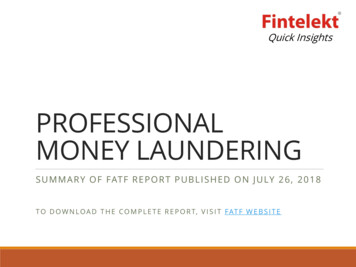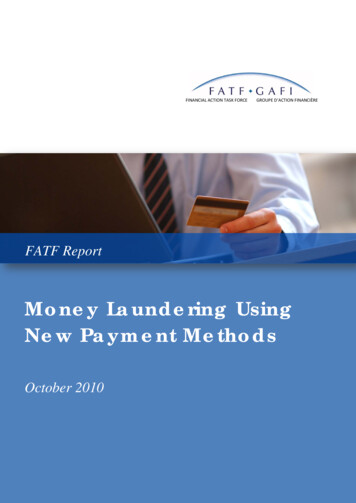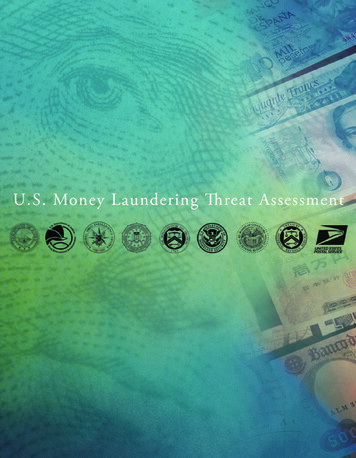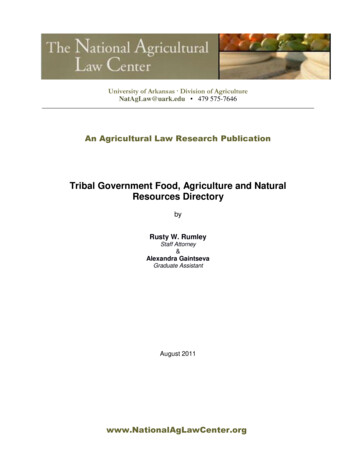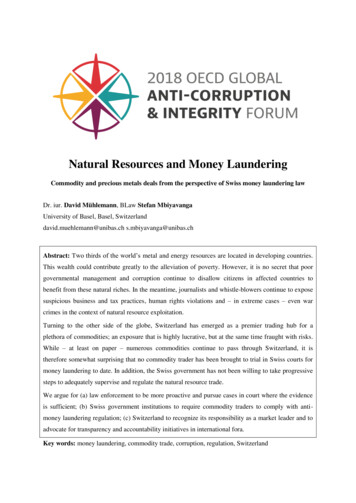
Transcription
Natural Resources and Money LaunderingCommodity and precious metals deals from the perspective of Swiss money laundering lawDr. iur. David Mühlemann, BLaw Stefan MbiyavangaUniversity of Basel, Basel, Switzerlanddavid.muehlemann@unibas.ch s.mbiyavanga@unibas.chAbstract: Two thirds of the world’s metal and energy resources are located in developing countries.This wealth could contribute greatly to the alleviation of poverty. However, it is no secret that poorgovernmental management and corruption continue to disallow citizens in affected countries tobenefit from these natural riches. In the meantime, journalists and whistle-blowers continue to exposesuspicious business and tax practices, human rights violations and – in extreme cases – even warcrimes in the context of natural resource exploitation.Turning to the other side of the globe, Switzerland has emerged as a premier trading hub for aplethora of commodities; an exposure that is highly lucrative, but at the same time fraught with risks.While – at least on paper – numerous commodities continue to pass through Switzerland, it istherefore somewhat surprising that no commodity trader has been brought to trial in Swiss courts formoney laundering to date. In addition, the Swiss government has not been willing to take progressivesteps to adequately supervise and regulate the natural resource trade.We argue for (a) law enforcement to be more proactive and pursue cases in court where the evidenceis sufficient; (b) Swiss government institutions to require commodity traders to comply with antimoney laundering regulation; (c) Switzerland to recognize its responsibility as a market leader and toadvocate for transparency and accountability initiatives in international fora.Key words: money laundering, commodity trade, corruption, regulation, Switzerland
The opinions expressed and arguments employed herein are solely those of the authors and do notnecessarily reflect the official views of the OECD or of its member countries.This document and any map included herein are without prejudice to the status of or sovereignty overany territory, to the delimitation of international frontiers and boundaries and to the name of anyterritory, city or area.This paper was submitted as part of a competitive call for papers on integrity, anti-corruption andinclusive growth in the context of the 2018 OECD Global Anti-Corruption & Integrity Forum.
1.IntroductionExamples of the effect our insatiable hunger for cheap natural resources has in countries whosenatural resource governance is deplorable are plenty. Just recently, the ‘Paradise Papers’ revealedadditional proof of how commodity corporations acquired prime mining assets in unstable yetresource rich regions at prices hundreds of millions of dollars below expert evaluations (Guardian5.Nov.2017; Süddeutsche Zeitung 5.Nov.2017).A common modus operando in such deals is for a public official or rebel militia to corruptly orforcefully acquire control over a mining project (Wall Street Journal 13.Feb.2018; Heimann/Pieth2018; Franchini et al. 2016). Then, either the mining asset itself or the commodity it produces – bothof which are now proceeds of crime – are sold to middlemen or investors and the earnings aremisappropriated. Such deals contribute majorly to illicit financial outflows, empty state coffers andever-increasing debt burdens in developing countries. They help keep kleptocrats in office and are akey reason why populations in the global South face a bleak future and are continuously starved of thebenefits of their natural riches.While extractive industries are among the business sectors most exposed to corruption andother serious offenses (cf. Heimann/Pieth 2018; cf. CGMF 2015; OECD 2016), no Swiss commoditytrader has been brought to trial in Swiss courts for money laundering to date. This raises question,particularly because several corporations domiciled in Switzerland have been alleged to havepurchased assets in the types of deals mentioned above. At least from what is publicly known, itappears that public prosecutors have opened criminal investigations only after criminal complaintsfrom the public (Public Eye 2017; Public Eye 2018).This paper advocates for an increased focused on these issues, both in the national andinternational context. First, general remarks on the commodity trade in Switzerland (2.) and theconception of money laundering are provided (3.). Second, the paper discusses the Swiss anti-moneylaundering instruments, with special regard to problems that may occur in the context of naturalresource trading (4.). Finally, the authors conclude the paper with recommendations to the Swisslegislator and policy makers (5.).The facts and analysis recited in this paper are based on publicly available information found in(NGO) reports, press articles and legal literature. No primary information has been gathered. None ofthe statements made are intended or should be interpreted as accusations of criminal conduct. Thepresumption of innocence is always preserved for every person or entity mentioned.3
2.Overview of commodity trading in SwitzerlandThe commodity trade has a long-standing tradition in Switzerland, and over the last half-century, itbecame one of its most important sectors. Section 2.1. will provide an overview over the mainmechanisms of commodity trading. Section 2.2. will summarize the debate in the Swiss politicalsphere and the official position of the government vice versa the commodity sector and its challenges.2.1The essentials of the Swiss commodity tradeDespite its scarcity of natural resources, many ‘global players’ in the commodity sector are located inSwitzerland, making it one of the premier trading hubs for commodities worldwide: In raw oil, forexample, 35% of trades are done in Switzerland and it is also the largest trading platform for metals,grains, coffee and sugar (Swiss academies 2016; Betz/Pieth 2016; IPC 2013). The commodity trade isan important contributor to Switzerland’s GDP, as 7 of the 10 largest corporations of Switzerland areinvolved in commodity trading and/or extraction (Handelszeitung, 24.June.2015).Commodity trade in Switzerland dates back to the 18th century (Public Eye 2012; IPC 2013). Ithas, however, undergone major transitions and only few of the traditional trading houses havesurvived. Instead, a large number of new players joined; either foreign companies who settled inSwitzerland or newly incorporated Swiss companies (IPC 2013).On a fundamental level, a commodity trader’s core business model is the so called ‘transittrade’ or ‘physical trade’, where a commodity is produced or bought at place A and shipped to placeB, where it is sold at a higher price (IPC 2013). The commodity itself seldom ever reachesSwitzerland physically, except in the case of gold (on average, Switzerland refines 50-70% of theworld’s gold annually, Swissinfo 12.Oct.2012). The traders oftentimes administer large portions ofthe delivery chain from the mine to the buyer; including transport, but also insurances and storage(IPC 2012).Looking at the commodity trade in more detail reveals its complexity. Many trades are donewithin the same group of companies, e.g. Shell Nigeria selling oil to Shell Switzerland. Anothernoteworthy sector are inter-governmental trades (Public Eye 2012). The most important field ofbusiness of commodity traders, however, is the so called “free commodity trade”, where commoditiesare either sold via direct sales or via derivatives. Direct sales, i.e. trades between the trader and thebuyer, are either carried out under long-term supply agreements or on the ‘spot market’, where pricesfluctuate heavily and payment and delivery are performed ‘on the spot’ or with a short lag. Spotmarket transactions are the exception, however, as long-term supply agreements account forapproximately 90% of direct sales (Public Eye 2012).The ‘financial derivatives markets’ are key to modern commodity trade. Here, trades are oftenmade at a high frequency, based on sets of agreed standards and without visual inspection. The term4
‘derivatives’ encompasses a broad group of financial instruments such as swaps, forward contracts,futures contracts etc.Especially forward contracts – also referred to as ‘forwards’ – are an indispensable tool for acommodity trader. Therein, the parties stipulate date, price and quantity of a future sale ofcommodities. The fixed price offers the trader protection against the risk of falling prices. Thecounterparty, e.g. an industrial manufacturer, on the other hand, obtains protection from rising prices(IPC 2013). Forward contracts are also sought after investment tools for financial investors (IPC2013). Derivatives can either be traded at an exchange, or ‘over the counter’, the latter involvingnon-exchange based contracts which may be kept secret. At commodity exchanges, speculators,investors, bulk producers and consumers trade commodities either directly or through banks (PublicEye 2012).The commodity trade is capital-intense, wherefore close ties to the financial industry areessential (IPC 2013). Roughly 70-80% of the financing for commodity trading is provided by banks(IPC 2013). NGO reports such as “Gunvor in Congo” by Public Eye have shown, however, how largecommodity traders can slip into the role of banks themselves; a fact that will be relevant later in thediscussion (vide infra 4.2.2.).GunvorIn 2010, Gunvor, a Geneva-based oil trader, entered into a commercial relation with SNPC, the state oil producer of theRepublic of Congo. Apart from buying oil, Gunvor also arranged loans to Congo totalling at 750 mio. In order to mobilizethe funds, Gunvor used its good credit rating to obtain cheap capital from a bank. It, however, also injected 150-180 mio ofits own assets. For its service, Gunvor received “arrangement fees” of 14.7mio – all without being subjected to bankingregulations (Public Eye 2017).2.2Commodity trading in Swiss politicsMany outsiders wonder what precipitated Switzerland’s rise to the top of the global commodity trade.And in fact, the question why, for instance, such a large number of oil traders has chosen Geneva astheir place of business is a fair one.The official account on why Switzerland has become the main hub for trades in a number ofcommodities can be summarized in three points (cf. IPC 2013):1. Commodity trading’s long tradition in Switzerland,2. a neutral political framework, security, predictability and stability,3. a sophisticated and stable financial system, well-trained workers and a high standard of living.Despite these purported locational advantages, the Swiss government sees itself in constantcompetition with other countries (IPC 2013, listing Singapore, Dubai, the US and the UK). In order todefend its positioning vice versa its competitors, the Swiss government remains committed to5
providing a business-friendly framework, which translates to weak or inexistent regulation, lowtaxation and minimal oversight.Meanwhile, several NGOs, journalists and academics continue to expose scandals involving theSwiss commodity and precious metals industry (e.g. Public Eye 2017; Telegraph 27.May.2014;Heimann/Pieth 2018, HRW 2005). Furthermore, international organizations have documented therisks in the natural resource sector, including corruption, gold smuggling, tax fraud and evasion, drugmoney laundering and oil theft (OECD 2016, FATF 2012). The Swiss administration’s response,however, remains underwhelming: A report commissioned by the Swiss Federal Council evenconcludes that “[w]hile there does exist, in theory, a limited risk of such [commodity] transactionsbeing used for money-laundering, there is no evidence that this actually occurs in practice.” (IPC2013).3.The origins of money launderingMoney laundering was first criminalized in the United States of the 1980’s, after the country faced anever escalating ‘war on drugs’ against increasingly militarized cartels (Pieth 2016). In 1984, a USCommission to the President defined money laundering as the “process by which one conceals theexistence, illegal source or illegal application of income, and then disguises that income to make itappear legitimate” (cf. Pieth 2018b). In 1989, the US-Customs distinguished three phases of moneylaundering: first ‘placement’ of the illicit cash in the money circulation, secondly deliberateconfusion through so called ‘layering’ and thirdly ‘integration’ of the laundered funds into the legaleconomy (Report of the US-Customs to the Subgroup “Statistics and Methods” of the FATF 1989;Pieth 2016).Not least with the creation of the Financial Action Task Force (FATF), the criminalization ofmoney laundering gained international prowess. The FATF pursues a prevention-focused agendabuilding on the so called ‘gatekeeper theory’, pursuant to which professions that are ‘at the gates’ ofthe legal financial economy should identify illicit funds. Accordingly, not only banking institutionsbut also lawyers and notaries carry anti-money laundering duties (Trechsel/Pieth 2018).Thus far, this international push has left commodity traders untouched: The FATF onlyconsiders “commodity futures trading” to fall within the scope of its recommendations (FATF 2017).This despite the fact that a 2015 FATF Report identified several money laundering risks, at leastrelated to gold trading, e.g. the laundering of proceeds from narcotic sales in Colombia through goldtransactions (FATF 2015). This essay will showcase the need for more action in this regard (vide infra4.2.).6
4.The Swiss anti-money laundering regulationSwiss law on money laundering can primarily be found in Art. 305bis Swiss Criminal Code (Section4.1.) and in the Swiss Anti-Money Laundering Act (Section 4.2), which is an administrative law.4.1Criminal law – Swiss Criminal CodeThe following section provides an overview of the criminal offense of money laundering in the SwissCriminal Code (SCC) in the natural resource context. The starting point is Article 305bis SCC whichstipulates the objective and subjective elements of the offence of money laundering. The provisionaims to remove the monetary incentive of crime (cf. Pieth 2016).Art. 305bis Money laundering1. Any person who carries out an act that is aimed at frustrating the identification of the origin, the tracing or the forfeiture ofassets which he knows or must assume originate from a felony or aggravated tax misdemeanour is liable to a custodialsentence not exceeding three years or to a monetary penalty.[ ]2. [ ]A serious case is constituted, in particular, where the offender:a. acts as a member of a criminal organisation;b. acts as a member of a group that has been formed for the purpose of the continued conduct of money laundering activities;orc.achieves a large turnover or substantial profit through commercial money laundering.3. The offender is also liable to the foregoing penalties where the main offence was committed abroad, provided such anoffence is also liable to prosecution at the place of commission.4.1.1 OffenderAny person can qualify as offender and be held liable for money laundering. According to thecorporate criminal liability provision, Article 102 (2) SCC, corporations may be found guilty ofmoney laundering where they intentionally omitted to take all necessary reasonable organisationalmeasures to prevent the offence (Pieth 2016).The question of whether the perpetrator of the predicate offence can be his or her own moneylaunderer is disputed (cf. Pieth 2016). For the commodity trade, this question is highly relevant,however, as the following example showcases:GlencoreThe Paradise Papers have exposed new evidence that the Swiss commodity trader Glencore, or one of its subsidiaries, havetransmitted loans, cash and shares into offshore companies owned by Dan Gertler, a dubious middleman with excellentconnections up to the highest levels of government in the Democratic Republic of Congo (DRC) (Tagesanzeiger,26.Jan.2018; Guardian, 5.Nov.2017; Süddeutsche Zeitung, 5.Nov.2017). Court documents in the US indicate that Gertler has7
paid millions of bribes to top DRC officials in return for cheap mining licences (US v. Och-Ziff, DPA, Cr. No 16-516(NGG))Glencore, inter alia, supplied Gertler with a 45 mio. “incentivisation” package, contingent on him resolving licensing androyalty disputes with the DRC government. Gertler delivered and, in the following, Glencore obtained the requested licensesat a premium of several hundred million dollars. (Guardian 5.Nov.2017; Süddeutsche Zeitung 5.Nov.2017, Global WitnessBlog 10.Nov.2017).The matter is currently under investigation. Glencore denies any wrong-doing and states -consortium-ofinvestigative-journalists). Assuming but not alleging that Glencore, or its subsidiary, – through Gertler– have enabled the acquisition of mining rights in the DRC by bribery, does Glencore’s subsequentsale of the proceeds of the Congolese mine amount to money laundering? Two prominent responsesexist in Swiss doctrine and case law:On the one hand, the Swiss Federal Supreme Court – following the view of the FATF – insistson the criminal liability of self-money laundering: The Court argues that money laundering is anindependent offense, wherefore self-laundering is sanctioned in addition to the predicate offence(BGE 124 IV 274; 122 IV 211; 120 IV 323; Ackermann 2013). Several commentators, on the otherhand, see self-money laundering as the offender’s attempt at evading his or her own prosecutionwherefore they find the ‘privilege of non-punishment’ to be applicable (Arzt 1995; Trechsel/Pieth2018).According to the second opinion the perpetrator of the predicate offense would not beconvictable for money laundering. Pursuant to the decisions by the Federal Court, however, aconviction would be possible.4.1.2 Predicate offenceMoney laundering requires a felony as a predicate offence. Whether an act amounts to a felony ornot is determined exclusively pursuant to Swiss (criminal) law. Most internationally recognizedwhite-collar crimes are felonies under the SCC and are therefore qualified predicate offences. Since2014 – after pressure by the FATF – Switzerland declared aggravated tax misdemeanour as apredicate offence to money laundering.As a leading international financial centre, Switzerland is exposed to illegally gained foreignassets (Pieth 2018a). In order to fight international crime, the third paragraph of Article 305bis SCCclarifies that the offender is equally liable where funds of an offence committed abroad are launderedin Switzerland (Pieth 2017). The law however insists on the principle of dual criminality(Trechsel/Pieth 2018). But it is not required that the foreign state itself recognizes the offence as apredicate offence to money laundering (Pieth 2016).8
The predicate offence can be established by way of a court judgment. If, however, no suchjudgement exists, Swiss judges may apply domestic rules of evidence to the determination of whetheran asset is of criminal origin (Trechsel/Pieth 2018). Though, where the predicate offence wascommitted abroad, proofing it will frequently be difficult. Therefore, Swiss courts have applied a lowstandard of proof for establishing the link between crime and asset (BGE 120 IV 323).4.1.3 AssetDespite its name, money laundering is not only applicable to monetary transactions, but encompassesany asset with economic value (Ackermann 2013; Pieth 2018a). Apart from all forms of money andcurrencies, it also includes precious metals, real estate property and rights thereto (Dispatch 1998;Trechsel/Pieth 2018). Accordingly, a mine, a mining concession or the proceeds of mining qualify as‘assets’ pursuant to Art. 305bis SCC.In the context of a commodity deal tainted by bribery, the profits from the underlying contractwill often far exceed the bribe. To make
Jun 02, 2015 · University of Basel, Basel, Switzerland david.muehlemann@unibas.ch s.mbiyavanga@unibas.ch . Switzerland, making it one of the premier trading hubs for commodities worldwide: In raw oil, for example, 35% of trades are done in Switzerland and it is also
